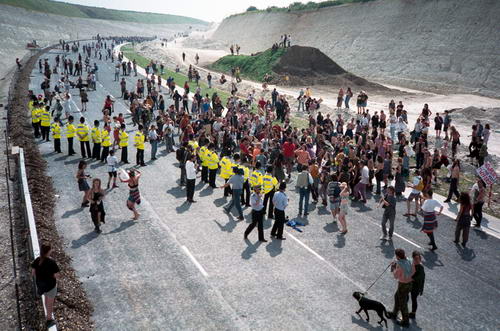Today (22/5/16) is the 23rd anniversary of Operation Greenfly at Twyford Down – one of the most exciting and audacious direct actions of the 1990s. Twenty-one years ago, the govt were trying to bulldoze a road through the most protected landscape in England and a massive direct action campaign erupted to stop them, which kickstarted the 1990s roads protest movement. We had an anonymous tip off that the road builders would have to close the whole of the M3 motorway over night to erect a ‘bailey bridge’ over it, to move the huge quantities of ‘spoil’ (chalky guts of Twyford Down) and spread it all over the water meadows below. They called this hugely important and strategic manoeuvre ‘Operation Market Garden”. So we launched “Operation Greenfly” to counter them.
They hired security guards from all over southern England, surrounded the site with razor wire, and had 100s of police protecting the site. However, as night fell and the motorway was about to close, some 200 protesters eluded police, went cross country and approached the site from an unprotected angle, miraculously trampling down the razor wire, and flooding onto the site, occupying the bridge!
For many people it was one of the most miraculous and empowering actions we’d ever pulled off. We occupied that bridge all night, drumming on the metal structure to keep our spirits up and warding off the “forces of darkness”, with the noise echoing across the water meadows and the silenced motorway. Fire breathers added extra drama. Hugely stirring and unforgettable. They had to draft in cops from all over southern England, and prise everyone off the bridge, cutting all the lock ons, taking hours. Over 50 arrests resulted with all of us being spread across police stations in the south.
They managed to just about get the bridge across the motorway before it reopened at 7am. However, they couldn’t complete the job and had to re-close the motorway 2 weeks later, causing major delays to their construction programme.
Were you there? What are your memories of that night?

